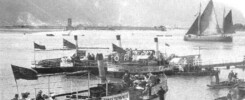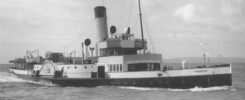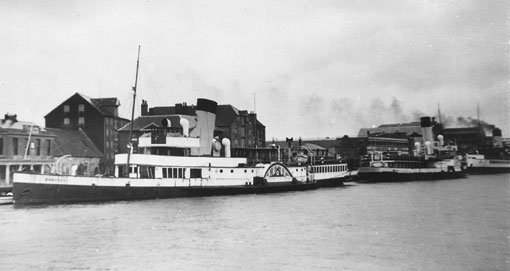
Weather was ever a problem for large sea-going excursion paddle steamer operators. If it was dull or rainy passengers did not want to sail. If it was too windy, the steamers could not get into the piers. If it was borderline there was ever the danger of damage. And on the days when the weather conspired against them, the steamers were left tied up earning no revenue but still costing money as in this picture of the Embassy, Monarch and Emperor of India alongside Poole Quay in the early 1950s.
Add to that the difficulties of keeping these large, elderly, sea-going paddle steamers with big crews commercially solvent in a climate of ever increasing wages, fuel, repair and maintenance bills and it is not so much astonishing that the businesses eventually all folded by the 1960s but that they managed to keep going as long as they did.
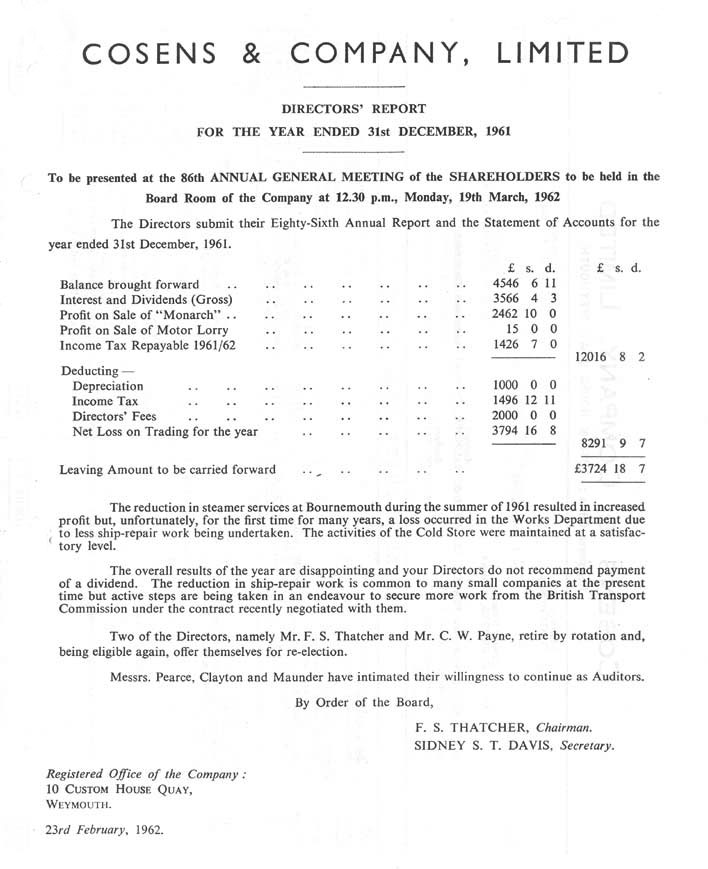
To illustrate the point, let’s have a look at a selection of details taken from the Directors’ Reports from 1950/61 in the accounts of Cosens & Company, operators of large, elderly, sea-going paddle steamers with big crews from Weymouth and Bournemouth.
Year Ended December 1950
The weather during the season was exceptionally bad and there was rain on approximately 50 days during the running period. In addition, rough seas and strong winds were experienced which resulted in 14 blank days at Bournemouth, 13 at Weymouth, 15 at Weymouth Beach and 145 trips had to be cancelled. There was a definite falling off in spending power of those who patronized the steamers due no doubt to the high cost of living, coupled with the International situation(1), but the greatest blow we encountered was the the serious epidemic(2) which broke out on the Isle of Wight just at the peak of the season, resulting in the fact that intending passengers simply refrained from travelling to the Island.
Year Ended December 1951
During the 1951 season the Company had not only to contend with rising prices of fuel, wages and stores but the weather was extremely bad and there was a falling off of passengers due, it was thought, to the Festival of Britain in London. As an example of the weather conditions there were 30 days when it was impossible to run from Bournemouth and no less than 60 trips to Lulworth Cove were cancelled. There were also 26 days when it was impossible to run from Weymouth Beach.
Year Ended December 1952
The excursion season of 1952 was an improvement on the previous one but the weather in August and September was very disappointing.
Year Ended December 1953
The shareholders will be aware of the unrest amongst the workers in the ship repairing and allied trades and any increase of wages to meet their demands must necessarily increase maintenance and running expenses of the paddle steamers.
Year Ended December 1954
The weather during the 1954 season was almost the worst on record. Weather experts tell us it was the wettest since 1946, the coldest since 1920 and the least amount of sunshine since 1912. So far as the company are concerned there were 13 blank days at Bournemouth and 49 trips had to be cancelled, whilst at Weymouth there were 8 blank days, 71 trips to Lulworth Cove had to be cancelled and 14 days when no work could be carried out at Weymouth Beach.
Year Ended December 1955
Although the weather during the 1955 season from July onwards was the best experienced for several years, the working results of our steamer services were not as satisfactory has had been hoped due, mainly, to heavily increased operating costs.
Year Ended December 1956
With the high cost of preparing ships for a limited period of service, constantly increasing operating costs and having to depend on weather conditions, it is becoming increasingly uncertain whether pleasure steamer services can any longer be operated remuneratively and the advisability of discontinuing them completely has been carefully considered. Assured however of the full cooperation of Bournemouth Corporation it has been decided to continue services in 1957. They will, however, be restricted to the peak holiday months and two ships only…
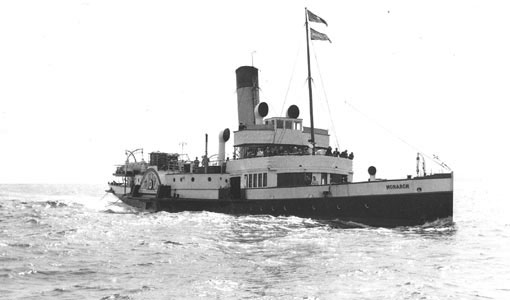
…the Monarch and…
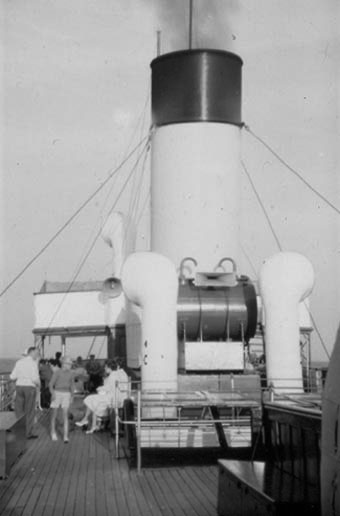
…the Embassy will operate from Bournemouth.
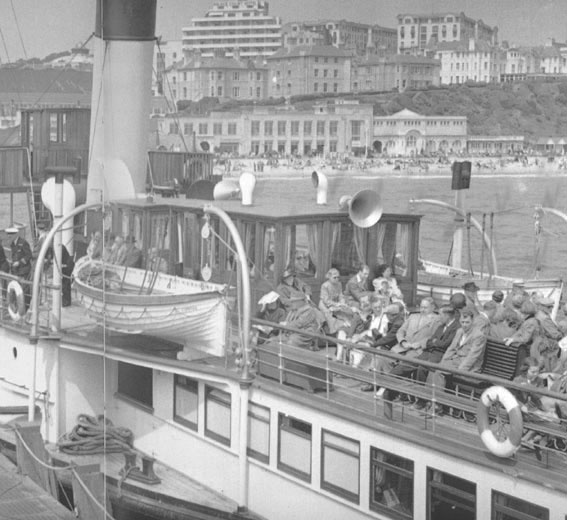
The Consul will also be operated for a further season from Weymouth.
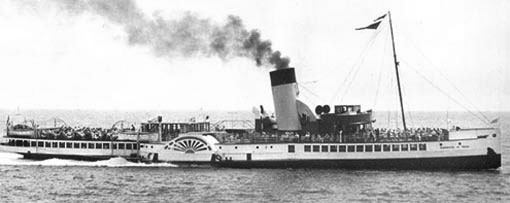
Following this decision the Emperor of India was sold early in January 1957.
Year Ended December 1957
It is particularly pleasing to record that in spite of the bad weather the steamer services also contributed to the Trading Profit. This was primarily due to the decision to restrict the services to the peak holiday months.
Year Ended December 1958
The Company’s steamer services were affected by the exceptionally bad weather conditions experienced during the summer months.
Year Ended December 1959
Although the weather during the 1959 season was good and carryings by our paddle steamer services increased, the higher revenue was largely off-set by heavier repair/maintenance costs.
Year Ended December 1960
The Company’s steamer services were again adversely affected by exceptionally bad weather experienced during the summer months which contributed to the reduction in the overall Trading Profit. Your Directors have decided to further reduce the pleasure steamer services and, during the summer of 1961, the Embassy only will be stationed at Bournemouth and the Monarch sold for scrap.
Year Ended December 1961
The reduction in steamer services at Bournemouth during the summer of 1961 resulted in an increased profit but, unfortunately, for the first time in many years, a loss occurred in the Works Department due to less ship repair work being undertaken(3). The ac-activities of the Cold Store were maintained at a satisfactory level
(1) The International situation, referred to in 1950, was the Korean War in which British forces were deployed.
(2) The epidemic, also in 1950, was polio which must have sent the fear of God into all, particularly parents holidaying on the South Coast. You can understand people’s reluctance to travel to the Isle of Wight.
(3) Cosens usually did refit work aboard the railway ships at Weymouth. With the old St Helier and St Julien withdrawn and replaced by the new Caesarea and Sarnia 1960/61 there was no refit work needed that winter on the mail-boats hence the loss in the Works Department.
As you can see from these details from the Directors’ Reports, with the exception of an ever changing regulatory framework which is with us in spades today, there is not much else new in the difficulties of running large, elderly, sea-going paddle steamers with big crews. The weather, ever increasing costs of wages, fuel, repair and maintenance plus big events, like the Festival of Britain in 1950, taking away rather than adding to passenger numbers, all ring down the ages and sound as familiar today as they did to the management of Cosens back in the 1950s.
There is a sort of desperation in the tone: “As an example of the weather there were 30 days when it was impossible to run from Bournemouth and no less than 60 trips to Lulworth Cove were cancelled”, “The weather during the 1954 season was almost the worst on record”, “The Company had not only to contend with rising prices of fuel, wages and stores but the weather was extremely bad”. On and on they go.
But, never daunted, Cosens tried to make it work as the details from the 1957 and 1961 accounts demonstrate. They were well aware that chasing revenue for its own sake is not always the answer to financial woes. Streamlining a business by cutting out loss-making activities can turn things round. By selling the paddle steamers Emperor of India in 1956 and Monarch in 1960 and cutting out sailings which lost money at either end of the season the profitability of the business went up which enabled them to continue trading for several years to come.
Note their very telling lines in the 1957 accounts: “…the steamer services also contributed to the Trading Profit. This was primarily due to the decision to restrict the services to the peak holiday months” and those for 1961: “The reduction in steamer services at Bournemouth (by withdrawing the Monarch) during the summer resulted in an increased profit”.
It may sound counter intuitive but, from a business perspective, Cosens was spot on. That was something which they could do something about and they did.
The weather, on the other hand, was something else. That, sadly, continued to dog them and, most inconveniently, interrupt their best efforts to keep large, elderly, sea-going paddle steamers with big crews in service.
How many days was it that Cosens lost at Bournemouth in 1951? Yes, that’s right: 30.
Kingswear Castle returned to service in 2023 after the first part of a major rebuild which is designed to set her up for the next 25 years running on the River Dart. The Paddle Steamer Kingswear Castle Trust is now fund raising for the second phase of the rebuild. You can read more about the rebuilds and how you can help if you can here.
John Megoran

